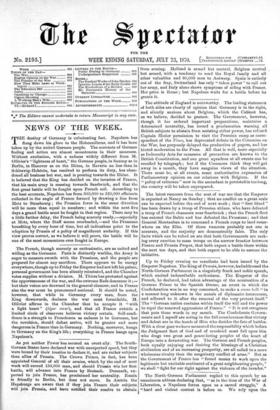Up to Friday evening no manifesto had been issued by
the Emperor Napoleon. The King of Prussia, however, hadaddressed the North-German Parliament in a singularly frank and noble speech, which excited indescribable enthusiasm. The Emperor of the French, he declared, had taken advantage of the nomination of a German Prince to the Spanish throne, an event in which the Confederation was in no way concerned, to make a casus belli "in a manner long unknown in the annals of diplomatic intercourse, and adhered to it after the removal of the very pretext itself." The "German nation contains within itself the will and the power to repel the renewed aggressions of France." "It is not arrogance that puts these words in my mouth. The Confederate Govern- ments and I myself are acting in the full consciousness that victory and defeat are in the hands of Him who decides the fate of battles. With a clear gaze we have measured the responsibility which before the Judgment Seat of God and of mankind must fall upon him who drags two great and peace-loving peoples of the heart of Europe into a devastating war. The German and French peoples, both equally enjoying and desiring the blessings of a Christian civilization and of an increasing prosperity, are all called to a more wholesome rivalry than the sanguinary conflict of arms." But as the Government of France has "found means to work upon the legitimate but excitable sentiment of a great neighbouring people," we shall "fight for our right against the violence of the invader."






























